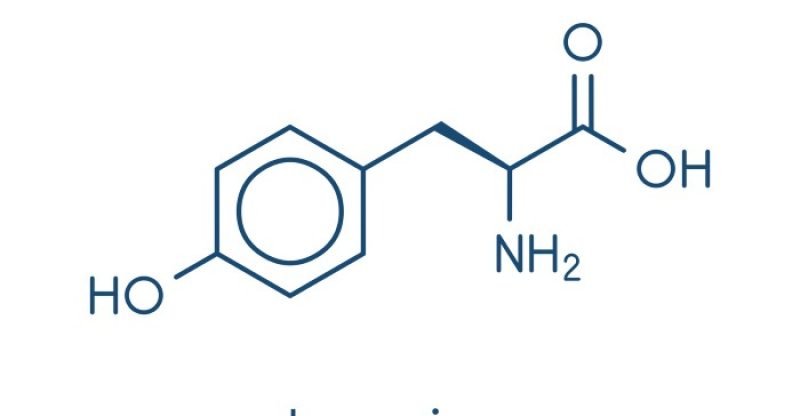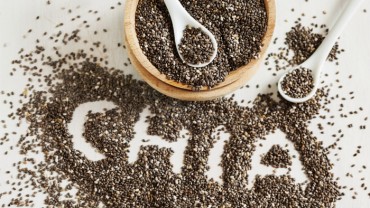10 Evidence-Based Benefits of L-Tyrosine
You are stressed.
You are gaining weight without trying, and cannot stay awake.
You are ready for a change.
L-tyrosine, also called tyrosine, may be the change you need to make your life better.
L-tyrosine, which can help you in stressful times, is something you should know more about.
You may wonder, what does L-tyrosine do?
What is Tyrosine?
L-tyrosine is a powerful aromatic amino acid.
It is a building block for the epinephrine, dopamine, thyroid, and norepinephrine hormones.
The body uses the amino acid to synthesize protein.
Your body produces L-tyrosine by itself.
This makes the amino acid a non-essential amino acid.
L-tyrosine is vital in helping your body when you are fatigued, stressed, or feeling cold.
When you have adequate levels of this non-essential amino acid, it provides a lot of stress-reducing benefits.
In addition to your body making L-tyrosine, you can obtain the amino acid by consuming different foods.
Foods high in L-tyrosine include many high-protein foods like chicken, eggs, and cheese.
What does Tyrosine Do?
In your body, L-tyrosine is mainly used in your brain.
It is a precursor to a group of neurotransmitters called catecholamines, which includes norepinephrine, dopamine, and epinephrine.
Catecholamines are used in order to execute various cognitive functions (1).
To transform into a catecholamine, L-tyrosine must undergo two steps.
First, the amino acid must convert into dihydroxyphenylalanine (DOPA).
An enzyme, which is a form of decarboxylase, turns the DOPA into one of three catecholamines.
The higher level of L-tyrosine increases the production of your neurotransmitters when your body needs more of them.
This means it can be difficult to benefit from L-tyrosine if you do not have enough of the amino acid and your neurotransmitters are depleted.
Now that you know what tyrosine is, what are L-tyrosine’s benefits?
They are numerous and are used in different types of medical conditions.
The following are some ways you may benefit from having enough of the amino acid in your system:
Helps You Thrive in Stressful Situations
Stress is a biological response symptom your body and brain experience when you are under pressure.
This pressure can take the form of losing a job to an illness or a divorce.
Your body judges the situation, such as unemployment, and decides whether it is stressful or not.
The decision is made on your sensory processes, sensory input, and past memories (2, 3, 4).
If your body judges the situation to be stressful, the base of your brain, the hypothalamus, takes charge.
The purpose of the hypothalamus is to take control of your stress response.
You may experience a flight-or-fight response.
Stress can cause you to feel sick to your stomach, or like you cannot complete a task.
It can produce other symptoms that can make you emotionally, mentally or physically ill.
Stress reduces your norepinephrine levels in your brain.
Tyrosine, a precursor to norepinephrine, can reduce the amount of stress you experience.
A study subjected rats to shock.
Their norepinephrine levels dropped drastically.
When the subjects were given tyrosine via an injection after receiving a shock, their norepinephrine levels remained the same.
This shows that L-tyrosine increases the rate of norepinephrine production during any stressful situation you experience.
Exercise is another type of stress on your body.
A study found that during exercise, taking tyrosine may improve physical performance.
Enough exercise must be done to produce a decrease in dopamine, and enough cognitive stress must occur in order to realize the benefits.
Amps Up Your Dopamine Levels
Dopamine is a neurotransmitter.
This means that it a chemical responsible for transmitting signals between your brain and nerve cells, or neurons.
The signals send messages to the brain.
The neurotransmitters then attach to docking-station molecules or receptors.
Dopamine is instrumental in the reward system and mood.
For instance, dopamine impels you to seek out another slice of pizza because the first slice was so great.
If you experience a decrease in dopamine, this means you do not have enough of the neurotransmitter to act as a motivator.
Low dopamine can make you feel like there is no joy in life.
You may find it harder to want to complete a task or get up in the morning.
You may not obtain pleasure from accomplishing certain tasks.
In addition to lack of motivation and pleasure response, you may also experience other symptoms of low dopamine, such as restless legs syndrome.
You may not want to interact with other people.
You may also experience low libido and forgetfulness.
Most of all, you may have a craving for sugary foods, and an inability to lose weight.
Tyrosine supplementation can increase the dopamine levels in your brain’s striatum.
It can also be used to increase your brain’s extracellular fluid due to an increase in dopamine levels.
However, the increase is short-term, because the tyrosine increase can slow the neuronal firing in your brain.
This will not decrease your levels of dopamine, but return them to normal levels.
Increases Cognitive Resources for Good Memory
The process of forming a memory involves encoding, retaining, storing, and recalling information and past experiences in your brain.
Your memory helps you process information quickly, and recall events and have the information at your disposal.
Encoding and processing information and events in your brain begin at birth and continue throughout your life.
The information or events, called memories, can be stored in the short-term or long-term memory.
Not everyone has a stellar memory.
You may not remember certain events or information. That is normal.
Medical conditions may also change the way you perceive, retain, and recall information and events.
Tyrosine supplements can restore specific cognitive resources used to help you increase your ability to remember.
A working memory is responsible for updating continuously and maintaining memory.
In fact, studies show that L-tyrosine replenishes only specific cognitive resources when they are depleted.
Improves Attention Deficit Disorders
Attention Deficit Hyperactivity Disorder, or ADHD, is a medical condition affecting children into adulthood.
If you have ADHD, you have differences in your brain activity and brain development that challenge your ability to sit still and maintain self-control.
The medical condition can affect your home life, school, and friendships.
You may struggle more than someone without ADHD at certain times to listen, pay attention, or follow directions.
Attention deficit disorders are separated into categories: inattentive, hyperactive, and impulsive.
Each category has different symptoms.
For instance, if you have inattentive ADHD, you are easily distracted and have trouble focusing.
Hyperactive ADHD involves being restless, fidgety, and easily bored.
L-tyrosine assists with the improvement of ADHD.
Clinical trials including patients with ADHD showed an improvement in symptoms due to the use of tyrosine.
At least eight out of the 12 adults who volunteered for the clinical trials showed some improvement in symptoms within two weeks.
However, after an eight-week period, the eight volunteers developed a tolerance to tyrosine (5).
If you have an attention deficit disorder, your neurotransmitter energy production may be impaired.
This is because of a predisposition you have because of the disorder.
In about five to 10 percent of attention deficit disorder cases, there was a benefit from taking tyrosine supplements (6).
May Conquer Depression
Depression, a serious medical condition, is characterized by persistent irritability and sadness.
Depression is not a short-lived medical condition but instead is defined as five or more symptoms lasting longer than two weeks.
It can come and go, depending on your symptoms and other factors.
Symptoms include loss of interest in activities, change in eating habits, insomnia, difficulty concentrating, and feeling tired.
Depression is treatable, often with prescription medication (7).
Some clinical trials found that depression was improved using tyrosine.
In these clinical trials, both tyrosine and a placebo were used.
In a single case involving a 30-year old woman suffering from depression, she showed a marked improvement in depression symptoms after undergoing tyrosine therapy.
The placebo treatment, by contrast, showed that depression symptoms immediately returned.
A placebo is the part of a clinical study that gives a volunteer a non-therapeutic treatment in order to compare the results to those of the volunteer receiving the real treatment.
Further clinical trials including two other volunteers with depression also showed improvement with the use of L-tyrosine.
It is important to note that in a larger clinical trial of 65 volunteers, there was no research to support that tyrosine can be used as an antidepressant.
This result may be due to depression being a complicated illness, and not occurring solely due to a lack of norepinephrine or dopamine.
Tyrosine may not only help people with depression, but with low norepinephrine and dopamine levels.
May Be the Building Block Thyroid Hormones Need
Thyroid hormones are made in your thyroid gland.
This gland does two things: it makes and releases two thyroid hormones.
These hormones are triiodothyronine (T3) and thyroxine (T4).
You need the right amount of thyroid hormones to replace dying cells and change the time it takes for food to move through your system and how quickly you burn calories.
Too much of the hormones speed up your body’s functions.
Too little thyroid hormones slow your body down.
One important function of thyroid hormones is that they control energy production in your body.
This aids in the renewal and repair of damaged cells.
This occurs while your body increases your resistance to constant stress.
Many animal studies have focused on observing tyrosine and thyroid deficiencies.
For instance, in a bird study, chicks with tyrosine deficiencies had much lower levels of both T4 and T3 in their blood.
Birds, only given a precursor to tyrosine, called phenylalanine, supplements did not gain as much weight as those given both supplements.
The birds who received tyrosine supplementation gained weight.
Studies were also conducted on rats.
Certain rats were placed under constant stress.
The stressed rats suffered from a reduction of both thyroid hormones.
The decrease in thyroid enzymes, oxidase, and peroxidase, was critical for thyroid production.
Using tyrosine supplements increased neurotransmitter norepinephrine levels.
These levels then increased thyroid hormone release.
The rats, given the tyrosine supplement not only lost weight, but they also experienced improved cognitive function.
The latter was measured in a maze test (8, 9).
May Treat Parkinson’s Disease
Parkinson’s disease is a progressive disorder affecting the nervous system and how you move.
It develops slowly. You may barely notice a tremor in one hand.
As the medical disorder progresses through the early stages your movement slows, your speech becomes slurred, and your face shows little expression.
Parkinson’s disease cannot be cured. Medication may improve your symptoms.
These symptoms include rigid muscles, change in speech, tremors slowed movement, and impaired posture.
The cause of Parkinson’s disease is the gradual death or breakdown of the neurons, or nerve cells, in your brain.
There is no one cause of the disease, but various causes include environmental triggers and genes.
Approximately nine volunteers in a Parkinson’s disease study were treated with probenecid and tyrosine.
The study volunteers showed an increase in their homovanillic acid located in their cerebrospinal fluid.
The presence of the homovanillic acid is a product of dopamine energy production.
It indicates that dopamine is being released in your brain.
This may strongly indicate a positive link to degeneration of neurons that release your dopamine increasing your homovanillic acid with the help of tyrosine treatment (10).
May Increase Your Inhibition
Inhibition is the unconscious or conscious attempt to constrain or curtail your behavior.
This behavior includes both desires and impulses.
Inhibition is necessary for social settings to prevent you from acting on a negative action, such as slapping your husband.
It also works to delay gratification from pleasurable activities, such as exercising before eating that rich dessert.
For some people, they may have a lack of inhibition because of a mental or personality disorder.
It can also occur because of alcohol or drug consumption.
If you have a lack of inhibition, you may benefit from L-tyrosine.
Taking tyrosine could help decrease unwanted lack of inhibition.
One study described the tendency as a lack of inhibitory control.
Some of the study participants were given tyrosine.
Other participants in the same study were given a placebo, which did not contain any of the amino acids.
They were then given a stop-signal task to perform.
A stop-signal task is one where the study participant clicks stop when they see a green arrow turn red.
The results of the study determined that those who were injected with tyrosine performed better than those participants who were injected with the placebo (11).
Therefore, you may benefit from taking a tyrosine supplement if you experience a lack of inhibition.
Beats the Winter Blues
Seasonal affective disorder, or SAD, is a type of depression related to the changing seasons.
SAD is commonly called the winter blues.
It typically begins and ends at the same time each year.
For instance, most people who experience SAD typically start in the fall and continue experiencing it into the winter months.
If you suffer from the winter blues, you feel moody and have no energy.
Other symptoms and signs of winter blues include feeling agitated, having difficulty concentrating, feeling hopeless, and experiencing frequent thoughts of suicide.
Also, you may oversleep, gain weight, or have a change in appetite.
Treatment for SAD may include psychotherapy, light therapy, or medication.
Many situations may call for an increased level of tyrosine.
For instance, you may experience stressful situations, such as elevated altitudes or cold weather.
In these situations, you need an increased level of tyrosine.
One long-term study conducted with participants in Antarctica included tyrosine supplements.
The study participants were given L-tyrosine supplements each day over the winter and summer months.
The study found that tyrosine levels in the participants did increase during the winter months.
The increase in tyrosine improved participants’ mood in the winter by 47 percent.
During the summer months, the participants were studied, too.
However, in the summer months, there was no increase or decrease in tyrosine or stress-related symptoms (12, 13).
Side-Effects
Many people have discussed the benefits they receive from taking an L-tyrosine supplement.
Tyrosine supplements are safe when taken by mouth and in safe doses.
Although L-tyrosine has a lot of benefits, you do need to know about the side-effects associated with L-tyrosine supplements.
These side-effects, which are symptoms experienced due to taking the supplement, have been discussed by some people who have benefited from taking it.
For instance, L-tyrosine may reduce your energy.
Some individuals taking the supplement became more tired as a result.
Your neck and shoulders may become stiff as a result of taking L-tyrosine.
One person taking the supplement noticed stiffness in their neck and shoulder area.
Tyrosine may also lead to weight gain.
One supplement user noticed that taking the tyrosine supplementation led to gaining weight.
At least three other people consuming the tyrosine supplement concurred with that user.
You may experience other side-effects such as nausea, vomiting, headache, joint pain, and heartburn.
However, those side-effects have not been proven.
Side-effects can vary, depending on your health and reaction to the tyrosine supplement.
If you are pregnant or breastfeeding, contact your physician about any side-effects you may experience if you are consuming an L-tyrosine supplement.
Drug Interactions
Some drugs do not mix well together when ingested.
This drug interaction may cause you to become sick. It may also diminish the effectiveness of each drug.
Like most drugs, tyrosine can negatively interact with other drugs.
It is best to check with your physician to determine which drugs have a negative interaction with L-tyrosine.
For example, L-tyrosine supplements negatively interact with thyroid hormone pills.
Taking the supplement leads to an increase in your body of thyroid hormones.
This is an unwanted side-effect.
Thyroid hormones control wide range processes in your body, such as regulating the amount of energy.
Thyroid hormones also help to repair and renew damaged cells.
However, too much of the thyroid hormones will have a negative effect on your body (15).
Also, tyrosine can interfere with the Parkinson’s drug called L-dopa.
Studies show that the nine participants had a 29 percent decrease of levodopa concentrations in their blood.
It also delayed the body’s ability to absorb the medication for about 24 minutes (14).
This occurs because tyrosine and levodopa compete in your brain.
Higher levels of L-tyrosine can reduce the movement of levodopa into your brain.
The result is an ineffective Parkinson disease treatment.
L-Tyrosine Synergies with Other Supplements
Although tyrosine supplements interact negatively with some drugs, major improvements were observed when it was combined with other supplements.
In some studies, users that consumed tyrosine to fight depression did notice improvements when taking the supplement with 5-HTP.
5-HTP is a tryptophan supplement that increases brain serotonin.
When used together, 5-HTP increases serotonin, while tyrosine increases your norepinephrine and dopamine.
Both supplements improve your mood and help you fight the symptoms connected to depression.
Other tyrosine users mentioned that antidepressants like Prozac only increase the amount of serotonin in your brain.
When taken with tyrosine, they can help increase the release of your neurotransmitters.
Some users experiencing fatigue and low adrenal output also used tyrosine supplements.
Those who used the supplement in addition to a 5-HTP supplement noticed similar benefits.
Energy levels also increased with the combination of Super Cortisol and tyrosine supplements.
The Super Cortisol supplement, from Now Foods, has assisted in helping patients who experience fatigue.
In addition, the combination of supplements causes brain fog to disappear.
It is vital that you do not combine L-tyrosine with another supplement before contacting your physician.
Drug mixing should only be done under a physician’s supervision.
L-Tyrosine Dosing
The recommended L-tyrosine dose ranges from 500 to 1,500 milligrams per day.
To improve alertness, you can take 150 mg per day.
You should always follow the L-tyrosine dose instructions on your tyrosine supplement’s label.
Also, contact your physician for the exact L-tyrosine dosing instructions you should follow.
Dos and Don’ts
When you are stressed and need help reducing it, you may benefit from taking L-tyrosine.
Tyrosine can also help with medical conditions, such as the winter blues and ADHD.
There are always some dos and don’ts for any type of supplement, and L-tyrosine is no different.
Do take tyrosine if you want to obtain relief from some medical conditions.
Do understand that this non-essential amino acid is made in your body.
You can also consume foods like cheese that are high in tyrosine.
For certain reasons such as a medical condition, tyrosine can decrease to an inadequate level.
This may cause you to experience harsher symptoms of your medical condition.
Do not take L-tyrosine if you are taking certain medications such as thyroid hormone pills.
Do not take a combination of tyrosine and another supplement without the supervision of a physician.
You do not want to experience any drug interactions or side-effects.
Also, it is best you consult your physician before you begin taking any type of supplement.
Now that you know more about L-tyrosine, enjoy the benefits this non-essential amino acid has to offer.
FDA Compliance
The information on this website has not been evaluated by the Food & Drug Administration or any other medical body. We do not aim to diagnose, treat, cure or prevent any illness or disease. Information is shared for educational purposes only. You must consult your doctor before acting on any content on this website, especially if you are pregnant, nursing, taking medication, or have a medical condition.
HOW WOULD YOU RATE THIS ARTICLE?






